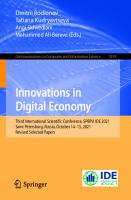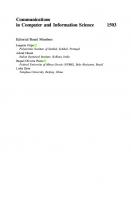Innovations in Digital Economy: First International Conference, SPBPU IDE 2019, St. Petersburg, Russia, October 24–25, 2019, Revised Selected Papers 3030600793, 9783030600792
This book constitutes the revised and extended papers of the First International Conference on Innovations in Digital Ec
258 0 16MB
English Pages 155 [159] Year 2020
Table of contents :
Preface
Organization
Contents
Economic Efficiency and Social Consequences of Digital Innovations Implementation
Developing a Mechanism for Assessing Cyber Risks in Digital Technology Projects Implemented in an Industrial Enterprise
1 Introduction
2 Relevance of Cyber Risk Management in Digital Technology Projects in Production Industry
3 Cyber Risk Management: Literature Review
4 Risk Controlling as an Up-to-Date System of Integrated Risk Management
5 Developing a Mechanism for Assessing Cyber Risks in the Project Activities of an Industrial Enterprise
5.1 The Structural and Logical Scheme of the Mechanism. Creating Architecture for Cyber Risk Management
5.2 Analyzing the External and Internal Cyber Environment of a Project
5.3 Cyber Risk Identification and Primary Analysis
5.4 Risk Modelling and Analysis
5.5 Risk Assessment and Outcome Analysis
6 Advantages of the Developed Mechanism Over the Existing Analogues
7 Conclusion and Further Research
References
Artificial Intelligence System for Processing Big Data to Determine the Value of Innovative Products in a Digital Economy
1 Introduction
1.1 Theoretical Basis of the Big Data Study
1.2 Big Data Analysis Tools
1.3 Innovative Technologies and Trends in Dynamics
2 Methodology
2.1 Analysis and Constructing of a Dynamic Model
3 Results and Discussion
3.1 Quantization of Big Data by a Neural Network
3.2 Innovative Products Predicted by Neural Network
3.3 Discussion
4 Program Code
5 Conclusions
5.1 Theoretical Foundations
5.2 AI-System for Identifying Innovative Trends
5.3 Quantization-Based AI-System to Identify Russia’s GDP Trends, Depending on the Cost of Innovative Products and VIX Option Stock-Exchange Quotation
References
Industrial, Service and Agricultural Digitalization
Development of the Format of CNI of Regional Food Market Participants Based on Digitalization of Business Processes
1 Introduction
2 Materials and Methods
3 Results
4 Discussion
5 Conclusion
References
Indicators for Assessing the Development of Smart Sustainable Cities
1 Introduction
2 Main Concepts
3 Literature Review
4 Sustainable Urban Development Assessment
5 Comparative Analysis of Indicators of the Sustainable Urban Development Level
6 Development of a System of Indicators for Analyzing the Level of Sustainable Urban Development
7 Conclusion
References
Regional Innovation Systems and Clusters as Drivers of the Economic Growth During the Fourth Industrial Revolution
Accelerating Nation Competitiveness Through Economic Corridor Development: Indonesia Masterplan Revisited
1 Introduction
2 Literature Studies
2.1 Regional Economic Development Theories
2.2 Indonesia Masterplan (MP3EI)
2.3 Economic Development of Indonesia
3 Indonesian Economic Corridors
3.1 Sumatera Corridor
3.2 Java Corridor
3.3 Kalimantan Corridor
3.4 Sulawesi Corridor
3.5 Bali-Nusa Tenggara Corridor
3.6 Maluku-Papua Corridor
4 Methodology and Data Sources
5 Indonesia Masterplan Revisited
5.1 Sumatera Corridor
5.2 Java Corridor
5.3 Kalimantan Corridor
5.4 Sulawesi Corridor
5.5 Bali-Nusa Tenggara Corridor
5.6 Papua-Maluku Corridor
6 Conclusion
References
Blue Economy as a Policy-Driven Innovation System: Research Funding and the Direction of Ocean-Related Innovation
1 Introduction
2 The Blue Economy – A Policy-Driven Innovation System
3 Blue Economy in Portugal
4 Actors and Networks in the Blue Economy Innovation System
5 Methodology
6 Results
6.1 The Role and Position of Actors
6.2 The Identification of Priority Areas
7 Conclusion
References
Regional Industrial Specialization: Case of Russian Electrical Equipment, Electronic and Optical Equipment Industry
1 Introduction
2 Literature Review on Foundations of Regional Industrial Specialization
3 Methodology and Data
4 Results and Discussion
4.1 Analysis of Employment Specialization
4.2 Analysis of Sales Specialization
4.3 Analysis of Wage Specialization
4.4 Evaluation of Interrelation Between Specialization of Russian Regions in the Electrical Equipment, Electronic and Optical Equipment Industry and Their Economic Growth
5 Conclusion
References
Response of an Educational System and Labor Market to the Digital-Driven Changes in the Economic System
The Methodological Features of the Economic Evaluation of Personnel Management Operational Projects
1 Introduction
2 Materials and Methods
3 Results
4 Discussion
5 Conclusion
References
Author Index
Preface
Organization
Contents
Economic Efficiency and Social Consequences of Digital Innovations Implementation
Developing a Mechanism for Assessing Cyber Risks in Digital Technology Projects Implemented in an Industrial Enterprise
1 Introduction
2 Relevance of Cyber Risk Management in Digital Technology Projects in Production Industry
3 Cyber Risk Management: Literature Review
4 Risk Controlling as an Up-to-Date System of Integrated Risk Management
5 Developing a Mechanism for Assessing Cyber Risks in the Project Activities of an Industrial Enterprise
5.1 The Structural and Logical Scheme of the Mechanism. Creating Architecture for Cyber Risk Management
5.2 Analyzing the External and Internal Cyber Environment of a Project
5.3 Cyber Risk Identification and Primary Analysis
5.4 Risk Modelling and Analysis
5.5 Risk Assessment and Outcome Analysis
6 Advantages of the Developed Mechanism Over the Existing Analogues
7 Conclusion and Further Research
References
Artificial Intelligence System for Processing Big Data to Determine the Value of Innovative Products in a Digital Economy
1 Introduction
1.1 Theoretical Basis of the Big Data Study
1.2 Big Data Analysis Tools
1.3 Innovative Technologies and Trends in Dynamics
2 Methodology
2.1 Analysis and Constructing of a Dynamic Model
3 Results and Discussion
3.1 Quantization of Big Data by a Neural Network
3.2 Innovative Products Predicted by Neural Network
3.3 Discussion
4 Program Code
5 Conclusions
5.1 Theoretical Foundations
5.2 AI-System for Identifying Innovative Trends
5.3 Quantization-Based AI-System to Identify Russia’s GDP Trends, Depending on the Cost of Innovative Products and VIX Option Stock-Exchange Quotation
References
Industrial, Service and Agricultural Digitalization
Development of the Format of CNI of Regional Food Market Participants Based on Digitalization of Business Processes
1 Introduction
2 Materials and Methods
3 Results
4 Discussion
5 Conclusion
References
Indicators for Assessing the Development of Smart Sustainable Cities
1 Introduction
2 Main Concepts
3 Literature Review
4 Sustainable Urban Development Assessment
5 Comparative Analysis of Indicators of the Sustainable Urban Development Level
6 Development of a System of Indicators for Analyzing the Level of Sustainable Urban Development
7 Conclusion
References
Regional Innovation Systems and Clusters as Drivers of the Economic Growth During the Fourth Industrial Revolution
Accelerating Nation Competitiveness Through Economic Corridor Development: Indonesia Masterplan Revisited
1 Introduction
2 Literature Studies
2.1 Regional Economic Development Theories
2.2 Indonesia Masterplan (MP3EI)
2.3 Economic Development of Indonesia
3 Indonesian Economic Corridors
3.1 Sumatera Corridor
3.2 Java Corridor
3.3 Kalimantan Corridor
3.4 Sulawesi Corridor
3.5 Bali-Nusa Tenggara Corridor
3.6 Maluku-Papua Corridor
4 Methodology and Data Sources
5 Indonesia Masterplan Revisited
5.1 Sumatera Corridor
5.2 Java Corridor
5.3 Kalimantan Corridor
5.4 Sulawesi Corridor
5.5 Bali-Nusa Tenggara Corridor
5.6 Papua-Maluku Corridor
6 Conclusion
References
Blue Economy as a Policy-Driven Innovation System: Research Funding and the Direction of Ocean-Related Innovation
1 Introduction
2 The Blue Economy – A Policy-Driven Innovation System
3 Blue Economy in Portugal
4 Actors and Networks in the Blue Economy Innovation System
5 Methodology
6 Results
6.1 The Role and Position of Actors
6.2 The Identification of Priority Areas
7 Conclusion
References
Regional Industrial Specialization: Case of Russian Electrical Equipment, Electronic and Optical Equipment Industry
1 Introduction
2 Literature Review on Foundations of Regional Industrial Specialization
3 Methodology and Data
4 Results and Discussion
4.1 Analysis of Employment Specialization
4.2 Analysis of Sales Specialization
4.3 Analysis of Wage Specialization
4.4 Evaluation of Interrelation Between Specialization of Russian Regions in the Electrical Equipment, Electronic and Optical Equipment Industry and Their Economic Growth
5 Conclusion
References
Response of an Educational System and Labor Market to the Digital-Driven Changes in the Economic System
The Methodological Features of the Economic Evaluation of Personnel Management Operational Projects
1 Introduction
2 Materials and Methods
3 Results
4 Discussion
5 Conclusion
References
Author Index

- Author / Uploaded
- Dmitrii Rodionov
- Tatiana Kudryavtseva
- Mohammed Ali Berawi
- Angi Skhvediani
- Similar Topics
- Economy
![Innovations in Digital Economy: First International Conference, SPBPU IDE 2019, St. Petersburg, Russia, October 24–25, 2019, Revised Selected Papers [1st ed.]
9783030600792, 9783030600808](https://ebin.pub/img/200x200/innovations-in-digital-economy-first-international-conference-spbpu-ide-2019-st-petersburg-russia-october-2425-2019-revised-selected-papers-1st-ed-9783030600792-9783030600808.jpg)


![Innovations in Digital Economy: Second International Scientific Conference, SPBPU IDE 2020, St. Petersburg, Russia, October 22–23, 2020, Revised ... in Computer and Information Science, 1445) [1 ed.]
3030848442, 9783030848446](https://ebin.pub/img/200x200/innovations-in-digital-economy-second-international-scientific-conference-spbpu-ide-2020-st-petersburg-russia-october-2223-2020-revised-in-computer-and-information-science-1445-1nbsped-3030848442-9783030848446.jpg)
![Data Analytics and Management in Data Intensive Domains: 21st International Conference, DAMDID/RCDL 2019, Kazan, Russia, October 15–18, 2019, Revised Selected Papers [1st ed.]
9783030519124, 9783030519131](https://ebin.pub/img/200x200/data-analytics-and-management-in-data-intensive-domains-21st-international-conference-damdid-rcdl-2019-kazan-russia-october-1518-2019-revised-selected-papers-1st-ed-9783030519124-9783030519131.jpg)



![Information Technology in Disaster Risk Reduction: 4th IFIP TC 5 DCITDRR International Conference, ITDRR 2019, Kyiv, Ukraine, October 9–10, 2019, Revised Selected Papers [1st ed.]
9783030489380, 9783030489397](https://ebin.pub/img/200x200/information-technology-in-disaster-risk-reduction-4th-ifip-tc-5-dcitdrr-international-conference-itdrr-2019-kyiv-ukraine-october-910-2019-revised-selected-papers-1st-ed-9783030489380-9783030489397.jpg)